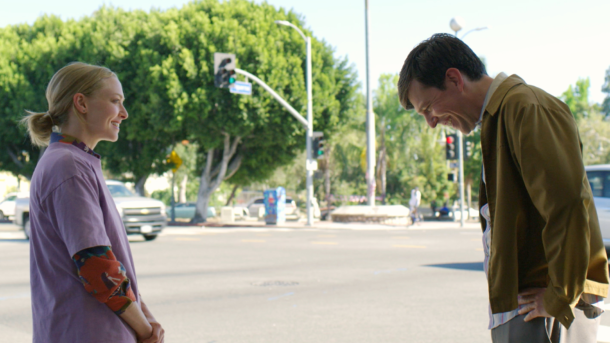 In the beginning of The Clapper, infomercial actor Eddie Krumble (Ed Helms) walks down a Los Angeles street that is depicted with an unreal, painted quality. He passes a wall that has graffiti on it that says “Enough with Reality.” That could be the mantra to this film, directed by Dito Montiel, which looks at the exploitative nature of Hollywood but in such a sappy-sweet way that every dig seems to come with a thoughtful tap on the head. The fake reality of Hollywood is taken out with, well, the fake reality of romantic comedy.
In the beginning of The Clapper, infomercial actor Eddie Krumble (Ed Helms) walks down a Los Angeles street that is depicted with an unreal, painted quality. He passes a wall that has graffiti on it that says “Enough with Reality.” That could be the mantra to this film, directed by Dito Montiel, which looks at the exploitative nature of Hollywood but in such a sappy-sweet way that every dig seems to come with a thoughtful tap on the head. The fake reality of Hollywood is taken out with, well, the fake reality of romantic comedy.
The multi-talented Montiel has directed a number of highly-regarded films — A Guide to Recognizing Your Saints (2006), Boulevard (2014), and Man Down (2015) — and The Clapper is based on Montiel’s novel Eddie Krumble Is the Clapper: A Novel. Eddie is content with his low-paying, but always interesting gig as a professional audience member in infomercials. When a late night show host — seemingly based on Jimmy Kimmel — notices Krumble’s enthusiastic performance on the infomercials and makes the footage into the latest viral hit, Krumble reacts in a way almost nobody else in Los Angeles would — he wants to be left alone.
While that gives The Clapper a unique angle, it does seem to stunt the film’s creativity after forty or fifty minutes of Krumble freaking out about not wanting to be famous. When Krumble finally agrees to appear on the show, his appearance is reminiscent of Harvey Pekar’s appearances on David Letterman’s show — an everyman who really doesn’t want to be part of the zaniness of late night gags. Helms inconsistently sometimes plays it like Pekar, but other times plays the nerdy character he portrays in his typical roles despite his character suffering from some very genuine emotional pain.
It’s a refreshing take from films about people who crave the spotlight, but Montiel doesn’t deliver on the potential. That’s because instead of a clever satire on fame and spotlight obsession — such as The King of Comedy or God Bless America — The Clapper is, at its heart, a romantic comedy about Eddie’s romance with Judy (Amanda Seyfried), a gas station attendant. This pushes what is otherwise a very interesting premise into dull territory. The last place The Clapper should be going is the safe route when it is set up to be a takedown of Hollywood’s absurdity and exploitative practices — an easy target, but one that’s always ripe for great material.
Eddie and Judy’s relationship is sweet, but it crowds out other aspects of the film that could be much more interesting. For example, Tracy Morgan plays Eddie’s best friend, Chris. Morgan doesn’t do anything particularly funny in the movie, and he constantly goes behind Eddie’s back without much protest from Eddie. Similarly, a late-innings appearance of Brenda Vaccaro as Eddie’s mother is tacked on as an easy out for a major conflict. The biggest shame is that a very early appearance by the late Alan Thicke playing himself in an infomercial seems to set the scene for biting satire, but Thicke’s intentionally less-than-flattering appearance stands as an early highlight that doesn’t get topped anywhere else in the rest of the film.
There are many interesting ideas in The Clapper, but like Montiel’s Boulevard the execution is lacking. However, at least Boulevard took many brave steps. The Clapper avoids stepping over similar lines, which would’ve likely made it a more engaging film.
Review Overview

















Recent Comments